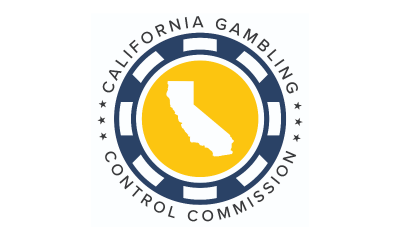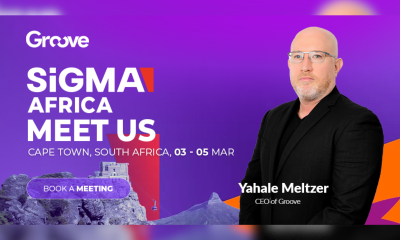Interviews
Yann Bautista: Peter & Sons is on its own path of slot creativity
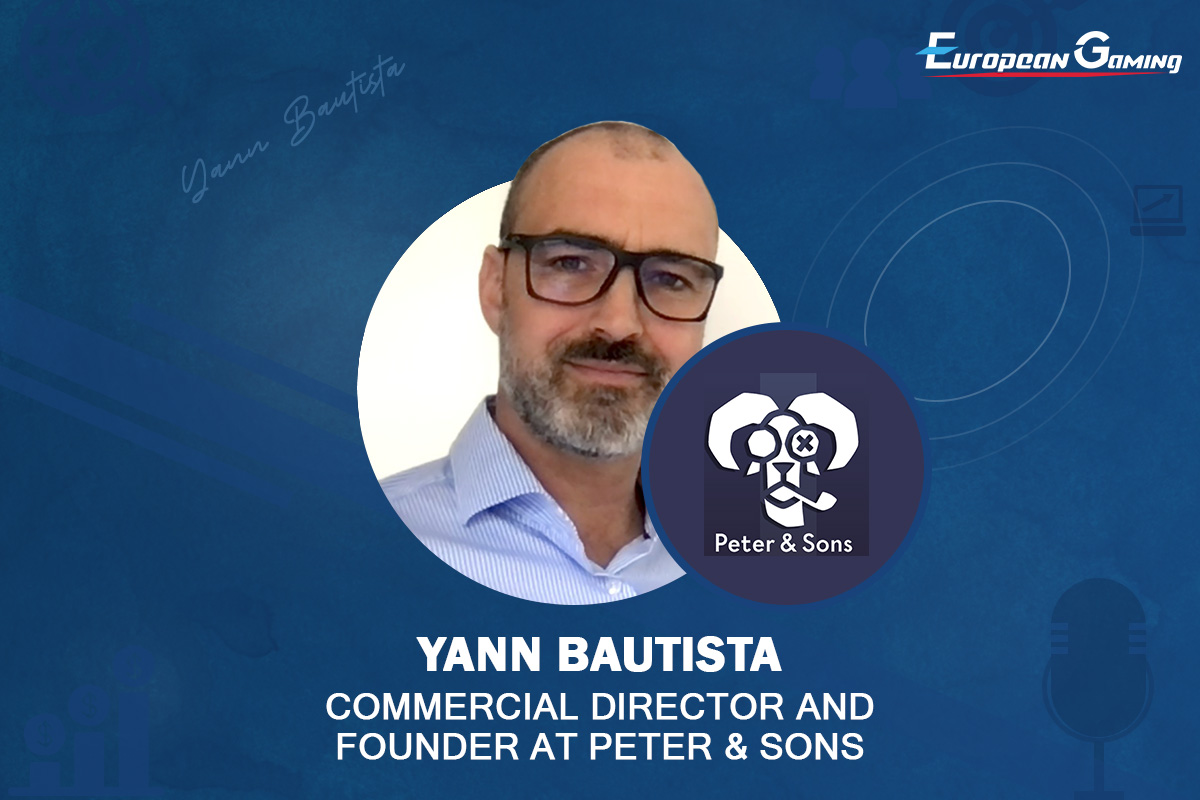
What’s the back story to Peter & Sons? Who is behind the studio and where did the name come from?
The Peter & Sons story begins in 2019 when six people with tons of experience in mobile casino and game development came together to launch a studio with a difference. A few of us had previously worked together in a similar venture part of a major online casino operator. We knew we had what it took to create thrilling games that would stand out in game lobbies, and we knew that we worked well together. With that, Peter & Sons was born. As for the name, we wanted something that would inspire tradition, a label that conjured the image of a century-old family business transitioning from retail slot machines to online casino games.
How have you developed your company, its culture and indeed the Peter & Sons brand?
From the get-go, we identified five pillars that each project, hire and decision would be based on. The first is creativity to the core – creativity is not just what we do, it’s how we do it. This means trying new things, pushing boundaries for players and ensuring that our games keep moving the industry forward. The second pillar is anti-boring. Life is too short to be just another games company doing more of the same. We are here to walk our own path, stand out from the crowd and leave our mark. The third pillar is to sweat the small stuff. We leave no stone unturned in our pursuit of perfection. We are laser-focused on the details that make a difference to players and our partners. Pillar four is easy does it. We are super easy to work with and always get the job done. Our games are easy to spot in the lobby, easy to play and easy to enjoy. The last pillar is player-obsessed. We are committed to improving the player experience of our games because we want to be their first choice each time they enter the casino game lobby.
You operate in a highly competitive market so how do you ensure your games stand out?
As veterans of this remarkable industry, we are aware of and appreciate the competitive landscape we operate in. In addition to our pillars, we also took the decision that wherever as a studio we can control and affect, we will do it in the most positive way. From game production, to commercial engagement, to support – we try to go the extra mile in all touch points with our partners in order to increase the value of our services and consequently the performance of the partners.
Is there a Peter & Sons hallmark that players can instantly recognise when experiencing one of your games?
We have come to learn that both players and operators can instantly spot a Peter & Sons game due to our unique style. Our logo really stands out, too, and sticks in players’ minds. We actually use our logo in some pretty cool ways and try to implement it in each title, sort of like an easter egg in a movie. The Peter & Sons goat can be found in each title, whether that’s on the loading screen, as an in-game character, on symbols or even on win coins. Some call it subliminal messaging, we call it savvy marketing.
It also helps that we have a very successful title in our portfolio. Barbarossa has become something of a flagship title and attracts a lot of attention from players and the wider industry. Unlike the usual churn curve of a slot, Barbarossa is showing elements of being a hit with a stable cohort of players that keep returning month in month out. We are working on a follow-up, Barbarossa 2, that will take the player experience to the next level and with even more big win potential.
How are you differentiating through game mechanics? Is this the most important area for a studio to differentiate?
For us, the magic is found in combining existing mechanics with new concepts and visuals to create a new player experience. For example, on our next run of games, we will be including special features around blocks – gameplay we initially introduced in Frozen Age – and more advanced mechanics around multipliers, as we did in Peter Hunter. We also have some classic slots in the works with consolidated mechanics including our twist on the fishing format. Mechanics are important, but if you look at the top-grossing games from the leading providers, they are mostly adaptations of existing mechanics.
How do you ensure your games appeal to a broad player audience?
We are all passionate about slot games and while our tastes differ, we know what matters most to players. This guides our mission as a studio, which is as simple as it is clear. And that is to curate a diverse portfolio that caters to the unique preferences of different players across different markets. We are unwavering in our dedication to achieving excellence in every aspect of game production. We don’t settle for the ordinary and instead meticulously study existing games in search of areas of improvement while drawing inspiration from our favourites. Reskins are a no-go for us. We take a quality-over-quantity approach and take great pride in delivering distinct experiences with each game we create.
This means we are always innovating to craft games that are not only fresh and captivating, but that are also infused with smart features. More than just mechanics, our emphasis is on seamlessly integrating these features into thematic elements within the game. The graphical presentation of these mechanical features is carefully curated to elevate the overall game experience, taking players on an amazing adventure with each spin of the reels.
Can you tell us more about SkillOnNet’s investment in Peter & Sons? How did this come about and how is it benefiting both parties?
Peter & Sons has basically become the content arm of SkillOnNet, which frankly brings some incredible perks for a relatively young studio. The first major upside is that we enjoy the resources that a tier one group such as SkillOnNet has at its disposal. This covers everything from accounting to legal and compliance. This support allows us to focus on what we do best, and that is producing brilliant games.
More importantly, we can leverage the dozens of local licences that SkillOnNet holds to deploy our content in regulated markets across the globe. At this point in our journey, this is a position we never expected to be in. Young studios struggle to obtain one or two licences in the early days, but we are already in a position to distribute in some of the biggest global markets including the UK, Spain, Denmark, Sweden, Ontario, Italy, Portugal, Germany and Greece, not to mention those that are in the pipeline including New Jersey, Peru, Brazil and more. This allows us to cater to tier-one operators via a single integration into multiple markets.
2023 was a big year for you. Can you share one or two major highlights?
The year started with the SkillOnNet investment and ended with Peter & Sons move on to the next chapter of its success story. This progression saw us move from distributing only via the Yggdrasil Master Program and the Relax Silver Bullet to getting our own platform and RGS. This in turn allows us to create brilliant partnerships and integrations with some of the best aggregators and operators in the space including Relax, Hub88, IGT and Playtech. We have also launched a new website https://peterandsonsgames.com, grown the team and secured certifications and licences. This has put an incredibly solid foundation in place for 2024 and beyond.
How will you carry the momentum you have built over the coming 12 months?
Last year we were focused on building the foundation on which we can grow and not only achieve but exceed our goals. We are now expanding our commercial team significantly. Using the licences and certifications we hold, we expect to grow our independent distribution in all major markets with all tier-one operators in each. We have already built huge momentum behind our games and, as a studio, we are well known. This is a very fortunate position to be in but one we intend to take full advantage of.
Compliance Updates
Endorphina Compliance Strategies Explained ahead of HIPTHER Prague Summit

Ahead of the HIPTHER Prague Summit 2026, we speak with Džangar Jesenov, Head of Compliance at Endorphina, to explore how the company approaches regulatory excellence, market expansion, and certification in an increasingly complex global iGaming landscape – and how strong compliance frameworks support sustainable growth across Tier-1 European markets.
You have been leading Endorphina’s compliance function since 2021. How has the regulatory landscape in Europe evolved during this period, and what shifts have had the biggest operational impact on suppliers?
If I were to compare Endorphina in 2021 and Endorphina in 2026, I would describe them as two fundamentally different projects that nevertheless share the same core identity. The primary objective remains unchanged. However, the tools, scope, and operational framework used to achieve that objective have evolved significantly.
The development of the project reflects various external factors, including increasingly stringent regulatory requirements across multiple jurisdictions, technological advancements particularly within the financial sector and, importantly, substantial strengthening of human resources. Ultimately, people remain the most critical element in any successful project.
– From a regulatory perspective, I would particularly highlight the introduction and expansion of B2B licensing policies
Across jurisdictions on different continents, and the increased responsibility placed on game suppliers.
– Most notably, the heightened focus on player protection and security
In my view, enhanced player safety is one of the most important developments in the industry. Delivering engaging, high-quality games that are fully compliant with applicable legal frameworks is the foundation of any successful online platform and this is a commitment we uphold 24/7/365.
Endorphina has successfully expanded its presence across Tier-1 European markets. From a compliance perspective, what are the key pillars that enable smooth market entry and long-term sustainability?
In practice, there are unfortunately no “miracle tools” that would allow us to operate seamlessly at the highest regulatory level.
– I may not be saying anything new or particularly surprising here, but behind every jurisdiction we enter lies a substantial amount of work
Each market requires extensive hours of analysis, including a detailed review of regulatory obligations, comparison of local data requirements and reporting outputs, development of internal policies tailored to the specific regional framework, structured internal data sharing across project teams, and the implementation of oversight mechanisms to ensure compliance with newly introduced rules.
There is a significant amount of daily routine involved continuous processes, reporting, analysis, and, where necessary, re-implementation of procedures, including updates or revisions of internal regulatory frameworks.
Certification and regulatory alignment remain major challenges for many suppliers. How does Endorphina structure its internal processes to ensure efficiency while maintaining full regulatory integrity?
With the development of regulatory obligations, our practices in this area are also evolving. Compliance in the gambling business matures like fine wine. The more stable your team is, the stronger your position on the market becomes. Today, regulations are being introduced in many new jurisdictions where gambling was completely prohibited just a few years ago, and I see this as progress from a regulatory perspective.
– Our internal processes are continuously evolving toward the automation of data that does not require increased attention
Human resources are instead focused on information that is more relevant and requires deeper integrity.
With increasing focus on information security, responsible gaming, and technical standards, how do you see the role of compliance teams evolving within modern iGaming organisations?
As regulatory obligations continue to evolve, so does our practical experience in this area. Compliance in the gaming industry matures over time – much like fine wine.
– The more stable and experienced your team is, the stronger your position in the market becomes
Today, regulation is being introduced in many new jurisdictions where gambling was completely prohibited just a few years ago. I see this as a positive development and a clear indication of progress from a regulatory perspective.
Endorphina has built a reputation as a trusted slot provider with a strong global partner network. How should compliance, product development, and commercial teams collaborate today to support scalable growth?
As Head of Compliance, I believe scalable growth is only achievable when compliance, product development, and commercial teams operate in full alignment rather than in silos. Compliance must be involved from the earliest stages of market entry and product design to prevent delays, reduce regulatory risk, and support sustainable expansion.
– Product development should focus on modular, certification-ready solutions that allow efficient adaptation across multiple jurisdictions
Commercial strategy must remain closely aligned with regulatory feasibility, ensuring that opportunities are both attractive and compliant. Ultimately, stable and experienced teams are the key factor in building long-term, regulatorily resilient growth.
Looking ahead to the next 12–24 months, which regulatory or market developments should operators and suppliers be preparing for most carefully?
In this area, we are working very intensively. Looking ahead, I anticipate further increases in regulatory obligations, faster development of regulated markets, and structural changes in core online gaming products.”
– I expect deeper integration of games with the player environment, placing greater emphasis on individual profiling and personalization of each session
These evolving models will inevitably be reflected in regulatory frameworks, with a stronger focus on player protection and proper tax accountability. At the same time, regulators will increasingly compete to attract high-quality market participants, a category to which Endorphina clearly belongs.
In the near-term perspective, many of today’s processes will become standard industry practice, while additional requirements will emerge, particularly those linked to the accountability and oversight of key individuals within licensed entities.
Endorphina is the GamingTECH Awards Party & Ceremony Sponsor at HIPTHER Prague Summit 2026. What would you like operators, partners, and industry peers to take away from engaging with your team during the event?
Thank you for the opportunity to be among the first to welcome our friends. First and foremost, I would like to thank everyone who will be joining us in person in one of the most beautiful cities in the world, Prague.
I wish all participants a truly enjoyable experience.
– Make the most of every moment spent among inspiring people
Boost your personal endorphin levels and take the opportunity to get to know the Endorphina team more closely.
The post Endorphina Compliance Strategies Explained ahead of HIPTHER Prague Summit appeared first on Eastern European Gaming | Global iGaming & Tech Intelligence Hub.
AI
FlexPlay: building a platform made to grow with its partners
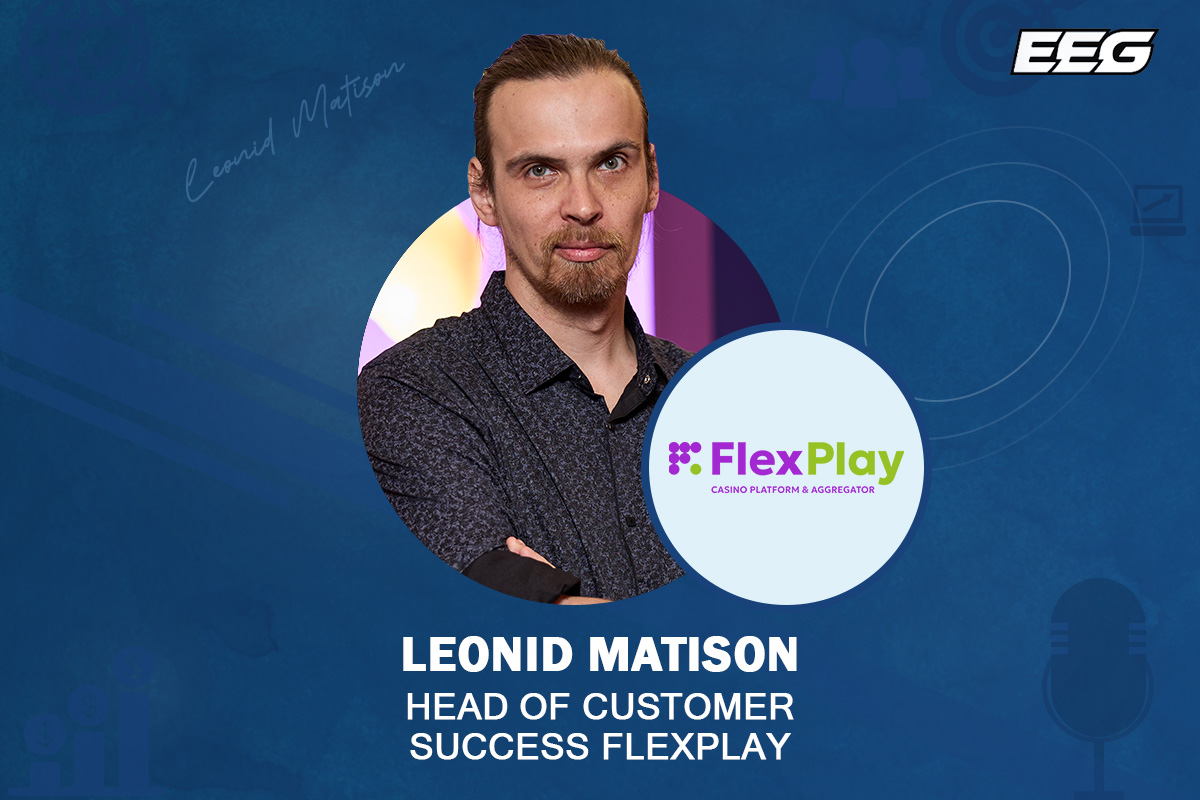
FlexPlay is entering a new phase with the launch of its own casino platform. Leonid Matison, Head of Customer Success, speaks with EEGaming about what inspired the company’s evolution, how it is helping partners adapt to change, and why a focus on flexibility, creativity, and collaboration is driving its vision for the future.
What inspired the move into the platform space, and how did that background shape your approach to creating it?
FlexPlay was born from EvenBet Gaming out of working closely with operators and studios as an aggregator, so we had a very clear view of where existing platforms were falling short. Many operators were forced to adapt their business models to rigid technology instead of the other way around.
Moving into the platform space was a natural evolution. We wanted to build a product that reflects how the market actually works today: fragmented regulation, fast-changing player behaviour, and the need to launch, test, and adapt quickly. That background shaped our approach significantly. Instead of building a “one-size-fits-all” platform, we focused on modularity, flexibility, and speed, so operators can grow without having to rebuild their infrastructure every time their strategy changes.
The platform market is full of established names. What makes FlexPlay stand out, and what kind of identity are you building for the brand?
Our differentiation isn’t about being louder or bigger — it’s about being more adaptable. FlexPlay is designed as a partner-centric platform, not a closed ecosystem.
We are building an identity around flexibility, transparency, and collaboration. Operators can customise their product, UX, content strategy, and growth roadmap instead of fitting into predefined templates. Commercially, we also remove unnecessary pressure at early stages, for example with models where partners don’t pay content fees until they actually start growing.
In a crowded market, identity comes from how you work with partners day-to-day, not just from features on a website.
You have described FlexPlay as a platform that “evolves alongside its partners.” What does that look like in practice for operators working with you?
We don’t treat launch as the finish line. We stay actively involved after go-live.
Operators receive ongoing support in analysing performance, adjusting content portfolios, testing new mechanics, and refining player engagement strategies. Our platform allows operators to add, remove, or prioritise content quickly, run experiments, and respond to real player data instead of assumptions.
We also actively listen to partner feedback and translate it into platform improvements. If a feature or workflow doesn’t serve operators in real conditions, we adjust it.
How does that flexibility help brands entering fast-changing or emerging markets where conditions can shift quickly?
Emerging markets rarely follow a stable or predictable path. This year, we are going to SiGMA Africa for the first time, and this continent is just the right example of how quickly and often market transforms. Regulation changes, payment preferences evolve, and player behaviour can shift very quickly.
FlexPlay’s flexibility allows operators to adapt without disruption: adjusting payment flows, reconfiguring bonuses, changing content focus, or localising UX. The platform isn’t locked into rigid structures, so operators can react to market signals in weeks rather than months.
This is especially important for brands entering highly volatile markets in Africa or LatAm, where the ability to pivot often determines success.
AI is a hot topic right now. How are you exploring its potential at FlexPlay, and what do you find most exciting about how it can genuinely support operators and players?
We approach AI very pragmatically. For us, it’s not about replacing people or creating black-box systems, but about enhancing decision-making.
We are exploring AI in areas like player segmentation, behavioural analysis, and content recommendations. It may help operators understand what players actually want and when. AI can also support smarter lobbies, more relevant promotions, and better detection of engagement patterns.
What excites us most is AI’s ability to reduce noise. It can highlight what truly matters and help them act faster and more confidently. But it can’t and will not fully replace strategic decision-making by humans.
Personalisation has become an essential part of modern player engagement. What does it mean to you in practice, and how is FlexPlay helping operators bring it to life?
For us, personalisation means relevance. Not just visuals or messages, but the entire player journey. FlexPlay enables operators to segment players based on behaviour, preferences, and performance, and then tailor content, bonuses, and communication accordingly. This helps players discover games that actually match their interests instead of scrolling through endless lobbies.
Good personalisation improves retention and trust. Players feel understood rather than pushed, and operators benefit from stronger long-term engagement.
But we suggest avoiding over-personalisation: if the players see only the recommended “long tail”, it may affect the operator’s revenue. Manual curation in addition to personalisation (like featuring a seasonal game during a holiday, or an operator’s personal favourite) allows for strategic promotions and branding.
Growth can be exciting but also challenging for operators. How do you and your team at FlexPlay support partners as they take that next step?
Growth often exposes weaknesses in technology or strategy. Our role is to help operators scale without losing control.
We support partners with analytics, reviews, and strategic guidance, helping them prioritise what to scale and what to optimise first. Technically, the platform is built to handle growth without forcing structural changes. Commercially, we remain flexible so that a transition is easier for operators.
Looking ahead, what are the key milestones or developments you are focused on for the year ahead?
Our focus is on deepening platform intelligence and partner value. This includes expanding AI-driven tools, improving content discoverability, and enhancing automation where it adds efficiency.
We are also investing in better insights for operators: not just reporting, but actionable recommendations that help them make smarter decisions faster.
Another priority is continuing to refine our platform based on real partner use cases, not theoretical ones.
And finally, when you think about FlexPlay’s future, what do you hope the company will represent within the wider iGaming industry?
I hope FlexPlay will be seen as a trusted growth partner — a company that helped operators build sustainable businesses rather than short-term results.
In an industry that often focuses on speed and scale, we want to represent balance: technology that adapts, content that makes sense, and partnerships built on mutual success.
If operators look back and say, “FlexPlay helped us grow the right way,” that will be the real measure of success.
The post FlexPlay: building a platform made to grow with its partners appeared first on Eastern European Gaming | Global iGaming & Tech Intelligence Hub.
boutique studios
Movers and Shakers: The blueprint for boutique studios looking to crack America
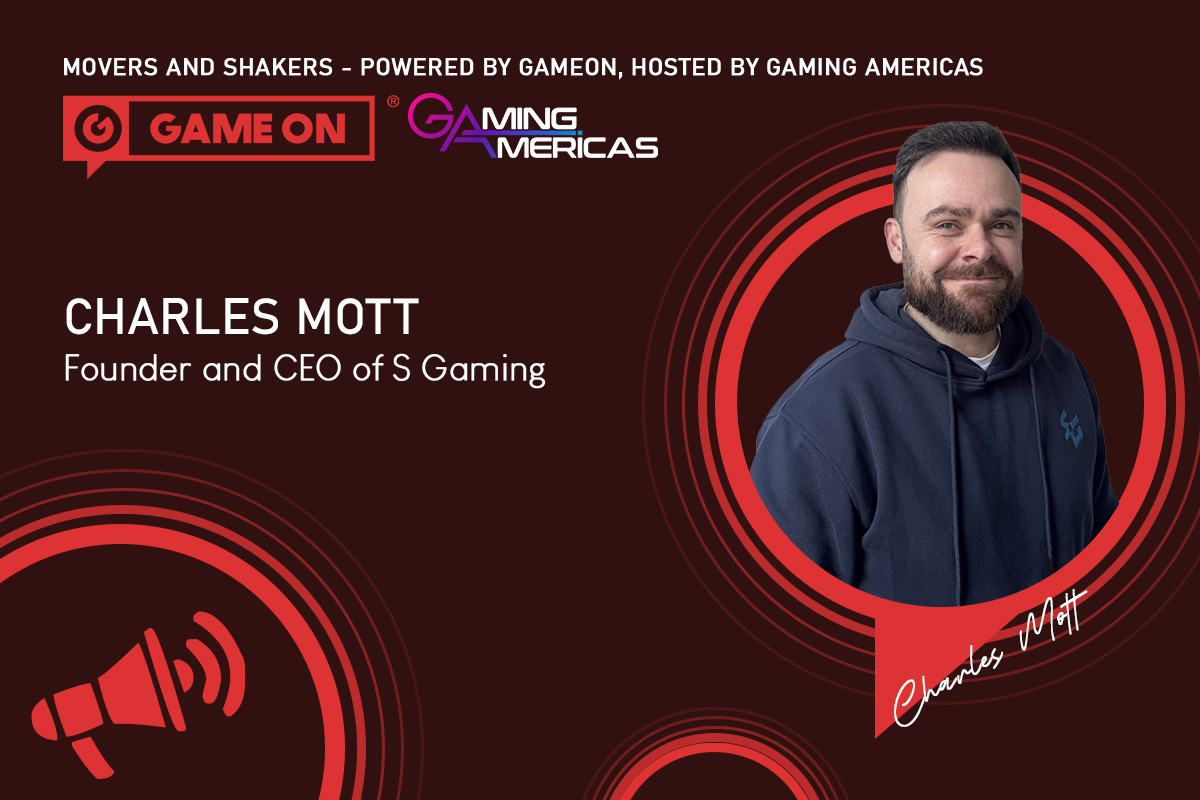
“Movers and Shakers” is a dynamic monthly column dedicated to exploring the latest trends, developments, and influential voices in the iGaming industry. Powered by GameOn and supported by HIPTHER, this op-ed series delves into the key players, emerging technologies, and regulatory changes shaping the future of online gaming. Each month, industry experts offer their insights and perspectives, providing readers with in-depth analysis and thought-provoking commentary on what’s driving the iGaming world forward. Whether you’re a seasoned professional or new to the scene, “Movers and Shakers” is your go-to source for staying ahead in the rapidly evolving iGaming landscape.
Charles Mott, Founder and CEO of S Gaming, says finding success in the US is a tough task, but that studios who can replicate the magic of the casino floor have what it takes to make it stateside
There are plenty of European studios that have set their sights on finding success in the US, but very few have actually managed to achieve it. This is because they are making a common mistake, and that’s failing to translate the preferences of US slot players into their games.
For more than a decade now, the UK and European markets have been defined by “the chase” – high volatility slots with massive, infrequent max wins and jackpots that deliver anticipation and thrills, but that also exhaust the player’s balance in minutes.
But if you walk on to the floor of any Las Vegas casino, the atmosphere is different. It’s about “time at machine”. It’s the neon, the regular dopamine hits of smaller wins and the ability to make $100 provide an entire evening’s worth of entertainment.
As the US market increasingly moves to online, with more states embracing regulated iGaming, it’s no longer finding its feet with players now actively looking for a digital version of the land-based soul they have loved for many years.
Moving away from the “big win” to the “long session”
US players have been culturally conditioned by the physical casino experience. Unlike the high-stakes digital environment of Europe, the American player often views slots as a leisure activity rather than a jackpot hunt.
This is why S Gaming has focused on fun, entertainment and sustainability, with our games matching the “steady tortoise” cadence of land-based slot machines. They still deliver lots of big win potential, but across longer and more engaging sessions.
For operators like BetMGM and Fanatics, both of which we’ve recently partnered with, it’s not just about fun, it’s about retention.
A player who loses their balance in three minutes is a churn risk, but a player who wins small, frequent prizes stays in the ecosystem for longer and ultimately generates a much higher lifetime value.
Efficiency over ego
But it’s not just about having the right games, distribution is also key to cracking America. This is a notoriously difficult market because it’s not one jurisdiction, it’s five (and counting) regulatory islands and in each, you need to secure regulatory approvals.
This is actually a moat that keeps many smaller studios out. It’s an issue we had to overcome, and ultimately looked for a partner that could help us bridge the gap. Our agreement with Gaming Realms allows us to use its remote game server and licences to launch into US states.
This “Infrastructure-as-a-Service” model allows a studio to focus on “game grammar” (math and art) while the partner handles the “plumbing” (compliance and connectivity). It’s the leanest way to hit the ground running with a tier-one operator across multiple states simultaneously.
Why tier ones are buying in
You might be wondering why a tier one giant like BetMGM has joined forces with a boutique UK studio and facilitated its launch into the US.
But the reality is that operators are fighting soaring acquisition costs right now and this means they no longer want more games, they want differentiated games that reduce churn and keep players coming back for more.
Our focus on sustainable entertainment aligns with current US regulatory requirements and the focus on responsible gaming. Games designed for longer, lower stakes sessions are inherently “safer” and more palatable to regulators and risk-averse operators alike.
And they just hit the mark more with players. Sure, winning is a big part of playing online slots, but how you get to the win and the perceived entertainment value is now just as if not more so important – not just in the US but in the UK and Europe, too.
The data-driven evolution
Success does not come from a single launch – it comes from having a feedback loop. We now have a handful of games live in the US market, including our flagship Triple 7 Jackpot title, from which we are gathering real-time data on player behaviour.
This is allowing us to move from “what we think players want” to “what the data tells us they love” and this in turn is allowing us to refine our product roadmap and the games we are producing for the US market, ensuring each title is more culturally resonant than the last.
The new era of transatlantic growth
Cracking America in 2026 isn’t about having the loudest brand of the biggest marketing budget – it’s about understanding the psychology of the casino floor.
The studio’s that succeed will be those that realise the US player isn’t looking for a new way to gamble, they’re looking for a digital version of the “Vegas” feeling they’ve known and loved for decades.
The post Movers and Shakers: The blueprint for boutique studios looking to crack America appeared first on Americas iGaming & Sports Betting News.
-

 Adjusted EBITDA6 days ago
Adjusted EBITDA6 days agoBragg Gaming Announces Select Preliminary Unaudited Fourth Quarter and Full Year 2025 Financial Results, and Issues Full Year 2026 Guidance
-

 Bagley-Keene Act6 days ago
Bagley-Keene Act6 days agoCalifornia Gambling Control Commission Issues Critical Guidance on Stakeholder Communications and Ex Parte Rules
-

 iGaming5 days ago
iGaming5 days agoPRAGMATIC PLAY UNEARTHS PROGRESSIVE MULTIPLIERS IN ROLLING IN TREASURES
-

 Comatel4 days ago
Comatel4 days agoCOMATEL CELEBRARÁ UNA FIESTA PARA CIENTOS DE OPERADORES TRAS FINALIZAR EL PRIMER DÍA DE LA FERIA ESPAÑOLA, INTERAZAR
-

 Africa6 days ago
Africa6 days agoGroove Targets Africa’s iGaming Boom at SiGMA Cape Town 2026
-

 Betty Casino6 days ago
Betty Casino6 days agoBetty Casino Announces Partnerships with Toronto FC and Toronto Argonauts
-

 Australia6 days ago
Australia6 days agoTabcorp Pays $158,400 Penalty for Taking Illegal In-Play Sports Bets
-

 ELA Games5 days ago
ELA Games5 days agoELA Games Powers the Reels with Retro-Electric Slot “Rapid Wild”


















